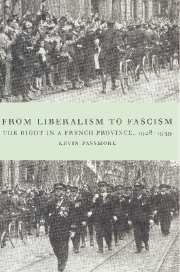Book contents
- Frontmatter
- Contents
- List of illustrations
- Preface
- List of abbreviations
- 1 Introduction
- 2 From France to the Rhône
- 3 Urban society in the Rhône
- 4 Rural society in the Rhône
- 5 The crisis of the right I: 1928–1932
- 6 The impact of the economic crisis
- 7 The crisis of the right II: 1932–June 1936
- 8 The Croix de Feu
- 9 The right and the Popular Front
- 10 Conclusion
- Appendix 1 Equations for multiple regressions
- Appendix 2 The conservative deputies of the Rhône, 1928–1940
- Select bibliography
- Index
10 - Conclusion
Published online by Cambridge University Press: 23 December 2009
- Frontmatter
- Contents
- List of illustrations
- Preface
- List of abbreviations
- 1 Introduction
- 2 From France to the Rhône
- 3 Urban society in the Rhône
- 4 Rural society in the Rhône
- 5 The crisis of the right I: 1928–1932
- 6 The impact of the economic crisis
- 7 The crisis of the right II: 1932–June 1936
- 8 The Croix de Feu
- 9 The right and the Popular Front
- 10 Conclusion
- Appendix 1 Equations for multiple regressions
- Appendix 2 The conservative deputies of the Rhône, 1928–1940
- Select bibliography
- Index
Summary
From the turn of the century until the late 1920s the right in the Rhône was dominated by a Catholic and liberal Progressisme which traced its origins to the Revolution and July Monarchy. It was committed to liberal democracy, market economics and free trade and was rooted in the historic association of Lyon with the manufacture of silk textiles, banking and international trade. Fear of the proletariat encouraged the elites to see the Church as a prop of the social order. Catholicism was also crucial to elite identity and provided a world-view inseparable from perceptions of the social and economic order. Through their domination of Chamber of Commerce and Fédération républicaine, wealthy families like the Aynards, Isaacs and Ribouds ensured that this liberal and Catholic tradition outlived the relative decline of the silk industry after the Great War. In the early 1920s the agricultural syndicate, the USE, was also won over to liberal republicanism. Liberal attitudes were shared by white-collar workers and even some manual workers thanks to the myth of the career open to talent. This was particularly true in the silk industry, where many employees worked in close contact with their bosses and where social mobility was relatively common. Status and social mobility were linked in turn to Catholic values, so that a white-collar worker could attribute perceived success to having adhered to the austere moral code of the Church. Much the same was true of the peasants on the plateau, where the same values could be seen as protecting better-off ‘bonnes families’ against land subdivision.
- Type
- Chapter
- Information
- From Liberalism to FascismThe Right in a French Province, 1928–1939, pp. 298 - 310Publisher: Cambridge University PressPrint publication year: 1997



